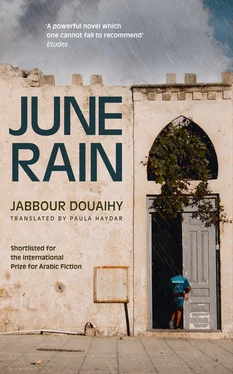Even the sixteen-foolscap-page report about the incident that came out on 27 July 1957 did not omit this contrast. In fact, it appeared right in the introductory description of the events. ‘Just as the hour 3:30 drew near and the skies sent down drizzling rain, the procession started moving from the house of the Al-Abd family towards the church, a distance of approximately 200 metres, led by the bishops, monks and nuns. To get out of the rain, people started entering the church from its side doors on the north and south sides. The rest of the procession entered through the western door opposite the town square. No sooner had the procession started entering the church, than a commotion broke out; a bullet was fired outside the church which was the signal and the spark…’ And so it was that the examining magistrate at the Beirut Appeals Court — the investigator in the matter of the breach of internal state security that took place on 16 June 1957 ‘which led to the murder and attempted murder of numerous people, and all the issues that accompanied it or branched out from it, as well as the individuals who participated or interfered in any manner’ — the examining magistrate did not resist his desire to speak about the rain, even though there was no need to mention it in the context of his court brief. At the end of the report, the magistrate, Adib al-Ashqar, asked for the death sentence for a long list of men, some of whom came with witnesses who stated that at the time of the incident the men were at a location far away from the town. Al-Ashqar, signatory to the incident’s sole remaining official document after the participants benefited from a general amnesty that relieved the judicial system of a matter whose events were of the utmost difficulty to reconstruct, repeatedly resorted to a somewhat sentimental style in his comments on ‘the breach in security for the sake of satisfying whims and ambitions’ and in his detailed description of an armed confrontation ‘on the steps of God’s altar’. These introductions were followed up with ratiocinations denoting a suppressed literary style belonging to the writer of the indictment who traced the start of the dispute back to ‘some forty odd years’ during which ‘the animosity buried deep in the breasts grew and intensified over time, waiting for the slightest spark that would set off a civil war and a frenzy of killing…’ Al-Ashqar miraculously escaped unharmed from an assassination attempt when a car on the Beirut highway passed by him and shots were fired at him, because of what was considered bias on his part against one of the parties.
The reporters circled the church, recording their initial impressions before approaching the door, only to find it locked. They looked right and left and then headed towards the shop. In that square, buckling under the hot summer sun, the only populated place was the shop.
‘Hello, Uncle.’
The shop owner stopped eating as soon as Eliyya came near. Okra was not his favourite dish, but if he were to object he’d end up with no food at all. His wife would not change her cooking no matter what. The arak helped. He already had the church key in his hand, having taken it out from the drawer the moment the taxi pulled up and Eliyya stepped out of it. He could tell beforehand which visitors were coming to pray and which were not.
‘Please lock the door when you’re finished and bring the key back to me. We worry about theft. A lot of strangers pass this way.’
Eliyya took the key and looked around the shop. He looked at the few items for sale. He opened his notebook and tried to sketch the place: the crime scene.
The shop owner refused to take any money for the chewing gum and the dusty package of cookies, despite Eliyya’s insistence. The donation was a good lead-in for conversation.
‘They repainted the church a while back. An emigrant in Nigeria subsidised the whole project. They completely refurbished it… Please come, join me for lunch.’ An invitation straight from his heart.
‘I’ll take a look around and come back.’
It was a church like any other church. Lots of statues and icons. A predominance of gold paint. New pews. An old church that resembled the nouveau riche . The men in the front pews and the women in the back.
He photographed everything.
More than a thousand bullets had been fired inside the walls of the church, people said.
Everything had been repaired.
Eliyya entered the sacristy. Many had taken cover there it seems… people on both sides. It was said that they didn’t fire a single bullet at each other. The sacristy had remained neutral…
Rays of the noon sun entered through the glass of the high round windows.
The sun shone, oblivious to what had happened here. It shone and its light came through the same round windows the day after the incident.
Eliyya sat in one of the pews at the back as if he were praying.
The townspeople did everything they could to wipe out the memory of the killings that had happened there. So there wouldn’t be anything left to suggest any bullets had been fired or any damage had been done, so no one could tell that all that blood had been shed there, inside the church.
They restored it to a normal village church whose walls reverberated with Syriac hymns and the whispers of old women as they knelt recounting their sins into the ears of a half-asleep priest trying to keep his head up.
Eliyya stood up. He couldn’t relax.
He went back to the shop.
‘It didn’t take you very long,’ the man said. Then he added, as if he had come to know exactly what this type of visitor was looking for, ‘They erased everything… except for two bullet holes no one besides me knows where to find.’
Eliyya smiled and asked him, ‘Do you mind if I take your picture?’
He stood up from his chair while he spoke, introducing himself. ‘I was born in Brazil and returned to Lebanon when I was ten years old, before the Second World War. My father was a peddler in the Amazon forest. He carried his wares on his back and sold relics from the holy cross and soil from Jerusalem to the local people. They were devout Christians in those lands, and the Indians were much more fanatic about their Christian faith than the whites. Most of the whites were lacking in morals…’
He laughed, revealing what remained of his teeth. As he went to stand in front of the door he continued, saying, ‘My father gave me the name Pedro like people over there. He had two wives — one in the countryside and one in São Paulo. I’m from the countryside wife, a Brazilian woman. He tore me away from her and brought me here…’ He burst out laughing once again.
‘One day he came from the city to the countryside with a parrot. I remember that parrot very well, before it died. He brought it to my mother and the parrot started calling my father’s other wife, as it was used to doing in São Paulo. “Margarita… Margarita… Ti amo… ”’
Eliyya asked him to move to one side a little so his shop front would be in the picture. Eliyya called to a young man who was standing nearby, lighting a cigarette. He asked him to take a picture of him. The shopkeeper gave him a strange look and went on, even though no one was listening to him anymore. ‘My mother became suspicious of my father. She asked him who that Margarita was he was so in love with. He told her the parrot was senile. So without his knowledge, she followed him back to São Paulo, all the way to his second house, and there a battle broke out between the two wives…’
‘What did you see the day of the incident?’ Eliyya interrupted, but in a calm voice.
‘… I was little, and I don’t remember anything, but my mother told me how she grabbed Margarita by her hair and threw her to the ground…’
Читать дальше












